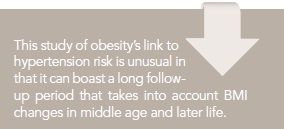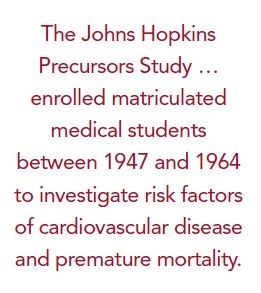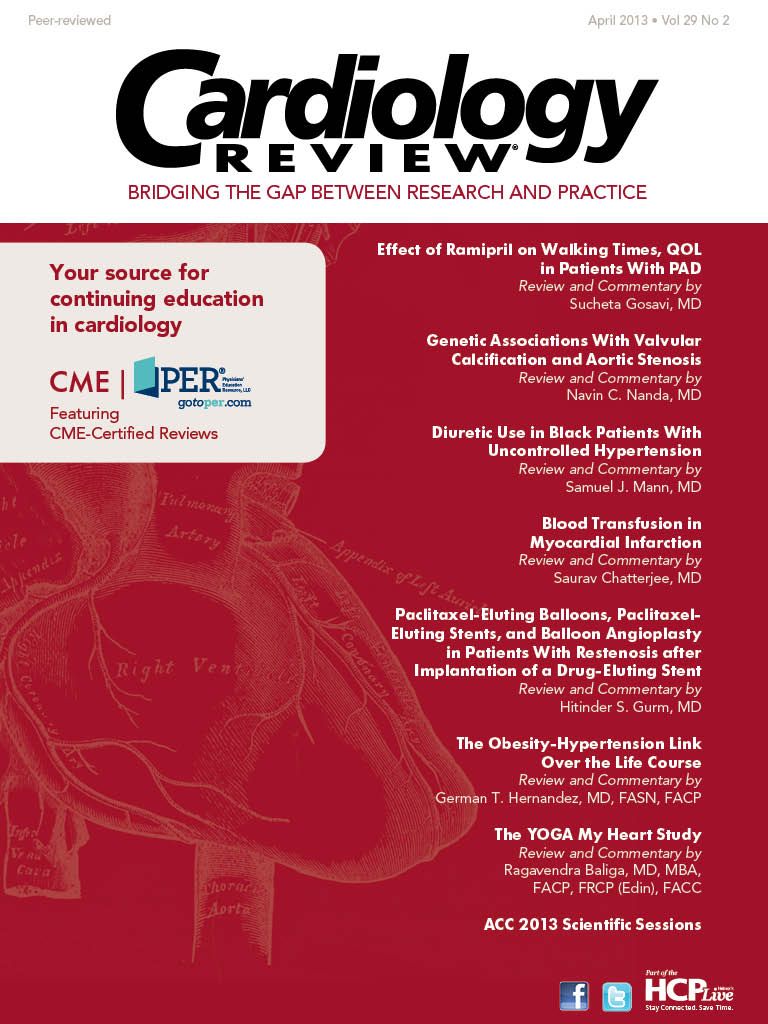Publication
Article
Cardiology Review® Online
The Obesity-Hypertension Link Over the Life Course

German T. Hernandez, MD , FASN, FACP
Review
Obesity and hypertension are major public health concerns with significant burdens to our society.1-3

Prior studies have linked obesity with the risk of developing hypertension; however, these investigations have been limited by their relatively short follow-up time and by adjusting only for baseline risk factors that change with age.4-6 It has remained uncertain whether changes in body weight during middle age and later life are associated with a subsequent increase or decrease in the risk of hypertension.
Recently Hasan Shihab, MBChB, and colleagues used the Johns Hopkins Precursors Study to assess whether body mass index (BMI) and its changes spanning young adulthood, middle life, and into late life were associated with an increase in incident hypertension. Shihab et al hypothesized that overweight and obesity increases the risk of hypertension, not just when the elevated BMI arises in young adulthood, but also with weight gain during midlife and later life.
Study Details
The Johns Hopkins Precursors Study is a prospective cohort study that enrolled matriculated medical students between 1947 and 1964 to investigate risk factors of cardiovascular disease and premature mortality.7 Participants had BMI, blood pressure, and other clinical characteristics assessed at baseline while in medical school and subsequently were followed via annual mailed surveys until 2005, with a median follow-up interval of 46 years. Of the 1337 students enrolled in the original study, 1132 white males without hypertension at baseline were included in the current analysis. Annual surveys included time-updated information on body weight, blood pressure measurements, cigarette smoking, alcohol intake, physical activity, coffee consumption, and parental history of premature hypertension.
The primary outcome of the study was the development of hypertension, defined as a blood pressure measurement of ≥140/90 mm Hg on more than 2 occasions, or a single measurement ≥160/95 mm Hg, or a reported diagnosis of hypertension.

The authors estimated the risk of incident hypertension associated with BMI categorized at baseline (normal weight, overweight, and obese), BMI as a continuous variable adjusted for changes over time, and BMI at 25, 45, and 65 years of age. Shihab and colleagues also evaluated the varying risk of hypertension associated with rates of change in BMI over the life course.
At baseline, the 1132 male participants had a mean age of 23 years, a mean blood pressure of 116/70 mm Hg, and a mean BMI of 23.1 kg/m2; 82% were of normal weight, 17% were overweight, and 1% were obese. During the follow-up period (median, 46 years), 508 participants developed hypertension. There was a progressive increase in the unadjusted cumulative incidence of hypertension with increasing category of BMI at baseline. After adjusting for parental history of premature hypertension and time-adjusted covariates (smoking, coffee and alcohol intake, and physical activity), the risk of hypertension was significantly higher for overweight and obese men compared with normal-weight men during young adulthood (hazard ratio [HR], 1.49; 95% confidence interval [CI], 1.15-1.95 for overweight; HR, 2.79; 95% CI, 1.30- 1.60 for obesity). When evaluating BMI as a time-dependent continuous variable, every increase of 1 kg/m2 was associated with a 6% higher cumulative risk of hypertension (HR, 1.06; 95% CI, 1.04- 1.08).
When evaluating changes in weight over a 20-year span, men with normal weight at age 25 who became overweight or obese at age 45 had a 57% higher risk of
hypertension compared with men with normal weight at ages 25 and 45 (HR, 1.57; 95% CI, 1.20-2.07). While men who were overweight or obese at age 25 and remained so at age 45 had nearly twice the risk of hypertension (HR, 1.91; 95 CI, 1.46-2.49), the risk was not increased for men who were overweight or obese in young adulthood but who subsequently had normal weight by age 45 (HR, 0.91; 95% CI, 0.43-1.92).
When comparing the rate of change in BMI over the 46 years of follow-up, men in the highest quartile of BMI change (1.60-15.9 kg/m2/yr) had the highest adjusted risk of hypertension (HR, 2.52; 95% CI, 1.82-3.49). Men in the thirdhighest quartile of BMI change had a HR of 2.13 (95% CI, 1.53-2.97), and men in the second-highest quartile of BMI change had a HR of 1.51 (95% CI, 1.08-2.12).
The authors conclude that their study demonstrates that higher weight in young adulthood and weight gain through middle age both increase the risk of subsequently developing hypertension.
References
1. Cutler JA, Sorlie PD, Wolz M, Thom T, Fields LE, Roccella EJ. Trends in hypertension prevalence, awareness, treatment, and control rates in United States adults between 1988-1994 and 1999-2004. Hypertension. 2008;52:818-827.
2. Egan BM, Zhao Y, Axon RN. US trends in prevalence, awareness, treatment, and control of hypertension, 1988-2008. JAMA. 2010;303:2043-2050.
3. Flegal KM, Carroll MD, Kit BK, Ogden CL. Prevalence of obesity and trends in the distribution of body mass index among US adults, 1999-2010. JAMA. 2012;307:491-497.
4. Juonala M, Magnussen CG, Berenson GS, et al. Childhood adiposity, adult adiposity, and cardiovascular risk factors. New Engl J Med. 2011;365:1876-1885.
5. Neser WB, Thomas J, Semenya K, Thomas DJ, Gillum RF. Obesity and hypertension in a longitudinal study of black physicians: the Meharry Cohort Study. J Chronic Dis. 1986;39:105-113.
6. Radi S, Lang T, Lauwers-Cances V, et al. One-year hypertension incidence and its predictors in a working population: the IHPAF study. J Human Hypertens. 2004;18:487-494.
7. Shihab HM, Meoni LA, Chu AY, et al. Body mass index and risk of incident hypertension over the life course: the Johns Hopkins Precursors Study. Circulation. 2012;126:2983-2989.
8. Klag MJ, He J, Mead LA, Ford DE, Pearson TA, Levine DM. Validity of physicians’ selfreports of cardiovascular disease risk factors. Ann Epidemiol. 1993;3:442-447.
Commentary Consider Lipid-Lowering Therapy
Shahib and colleagues elegantly show that over an unprecedentedly long period of follow-up, overweight and obesity during young adulthood are significantly associated with high risk of developing hypertension despite adjustment for important covariates. Also, it is remarkable that Shahib’s study demonstrates that weight gain confers a high risk for subsequent hypertension, whereas weight loss over the life course appears to mitigate the increased risk.
The study by Shahib et al has many strengths, including the long period of follow-up, frequent determinations of body weight and blood pressure extending into later life, a very high survey response rate, and a high correlation between self-reported and study personnel—obtained body weight and blood pressure measurements.8 Another major strength of the study is that BMI was also analyzed as a time-dependent changing variable throughout the life course, as were important confounding covariates such as cigarette smoking, coffee intake, physical activity, and parental history of premature hypertension.
In terms of limitations, the study did not take into account adipose tissue distribution or body fat composition. Additionally, because the study only included white male medical students/physicians, its generalizability to women and other populations of different race/ethnicity or to groups with different social determinants of health may not be applicable. Despite these few limitations, the study by Shahib and colleagues provides an important contribution to our knowledge of the impact of body weight gain on the risk of developing hypertension throughout the life course.
About the Author
German T. Hernandez, MD, FASN, FACP, is Director of Nephrology Research and Associate Professor of Medicine in the Division of Nephrology & Hypertension and Biostatistics & Epidemiology at the Paul L. Foster School of Medicine, Texas Tech University Health Sciences Center in El Paso. He is the El Paso site principal investigator for many multicenter clinical trials. Dr. Hernandez received his medical degree at Harvard Medical School. He completed his postgraduate studies in internal medicine and nephrology as well as advanced training in clinical research at the University of California, San Francisco.
Shihab HM, Meoni LA, Chu AY, et al. Body mass index and risk of incident hypertension over the life course: the Johns Hopkins Precursors Study. Circulation. 2012;126:2983-2989.






